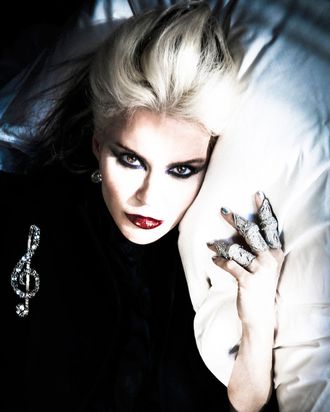
It is up for interpretation whether or not Daphne Guinness, the 50-year-old heiress and original multi-hyphenate, was wearing pants when we sat down for an interview this winter in her room-with-a-view at the Carlyle Hotel. When asked, she replied both yes and no, apologizing that she looked the way she did because she was running late.
She had thrown together a crisp white button-up with a popped collar; a two-way sequin cardigan designed by her friend L’Wren Scott; black tights that doubled as short-shorts; plus impossibly high heels, on which her slender frame balanced with the ease of someone wearing Allbirds. And then there was her hair, done up in its signature, silvery beehive. If Daphne Guinness is apologizing for her appearance, then we are all in big trouble.
It quickly became clear that for once, she didn’t want to talk about clothes. Following the untimely deaths of her friends Isabella Blow and Alexander McQueen as well as her brother, in 2007, 2010, and 2011 respectively, Guinness dived into music, a longtime but oft-overlooked passion of hers. In 2016, she released her first full-length album, Optimist in Black. And last week, she dropped her second, Daphne & the Golden Chord.
It was David Bowie who originally put Guinness in touch with his longtime producer, Tony Visconti, who worked on both of her albums. Unlike the first, the second was recorded on analog tape at British Grove Studio in London, where consoles previously used by the Beatles and Pink Floyd still spin today. The Golden Chord picks up where Optimist in Black left off, touching deftly upon events and characters real and imagined, including certain unnamed chaps who don’t understand the Velvet Underground.
Below, Guinness gets the Cut up to speed on where she’s been, and where she’s headed next.
How is your second album different from your first?
I knew in the middle of the first album that there was a breaking point. There were really, really, really heavy thoughts and heavy sounds. Enormously heavy. It was a dark, dark hole. A beautiful dark hole, because I love that. I love those haunting sounds. But I thought that I needed to kind of climb out of that. I thought: You know what? I know how to write a straight rock-and-roll song. Something you can dance to a little bit more.
There’s a sense of humor to this album, which seems different from the last one.
The way I grew up was very much in the Monty Python scheme of things. You’re very serious about it, but also you’re not taking yourself that seriously.
You described the album as “the closest thing you can get to a memoir.” Did you take out stuff you thought was too personal, or did you put it all in there?
I didn’t take it out. I look at [the lyrics] and I go: God, I didn’t write that, did I? Oops. Poetry’s great, though, because you don’t have to be too specific. I’ll still have someone say to me, “I really understand what you’re saying.” And so you just think: Well, this happens to everybody.
There was one song that I wanted to ask about in particular — “Captain Catastrophe” — because there seems to be a lot in there, particularly about fashion. Was that your childhood nickname?
Yeah, it was. One of them.
Can you explain why?
I’d always be stubbing my toe or falling out of a tree. I was also a catastrophic thinker. There would be these terrible doom-laden things that I would say and then they would happen. But it’s more a jokey name, not anything too serious.
You wrote in the song notes: “I spent much of the ’90s in a bubble. I made the mistake of seeing someone and thinking they looked groovy, only to discover they were a starfucker.”
Yes!
“A starfucker who had never heard of the Velvet Underground.” Can you please talk to me about this statement?
It’s so true. I guess what happened is people used to dress the way they felt or [inspired by] the bands they listened to. When I was growing up, you knew how people felt by what they were wearing. It didn’t have to be a brand or anything, but you’d just get this vibe off them. But you see people dressed up as hippies or as beatniks now and then you find out that they’re working on Wall Street, for heaven’s sake. It’s really weird, and they’re into Smooth FM. It’s like … What?
Why do you think that happened?
I think the image industry became very cyclical in nature and very, very fast. It’s like: Okay, what references are we gonna take? We’ll do this, we’ll do that. Grab this from this film, or whatever. People are reading these things and trying to copy these things, but they don’t actually know what the references are. The people that are styling it probably do know what the references are, but in the wider culture, not really. Everything’s in a sort of huge jumble now. It’s a reference of a reference of a reference.
Well, I saw that you follow Diet Prada on Instagram …
I love that. They’re so cool. I think they’re so witty and brilliant and I just love them. I think they’re great.
Do you think the fashion world needs Diet Prada?
Yeah, I do. But I love the fashion world. So many of my friends are in that world, and I’m in it to a certain degree. It would be a cheap shot for me to look down on it because it’s a very valid industry, and it’s changeable. What was relevant in the 18th century wasn’t relevant in the ’80s. It’s being a bit snobby to say: Oh well, things aren’t what they used to be. Nothing’s what it used to be, so it’s just change. But it’s funny when people have a sense of humor about it.
And are you already thinking about album number three?
Yeah. There’s so much. I wrote a lot of songs last week. Every day. Talking about this release, I’m like: Oh god. But the completion of something is to allow other people to make their own minds up about it. Or that’s what I’m telling myself. I feel much, much, happier. It’s all square in my head that not everyone’s going to understand the Velvet Underground. [Laughs.]
This interview has been edited and condensed.





